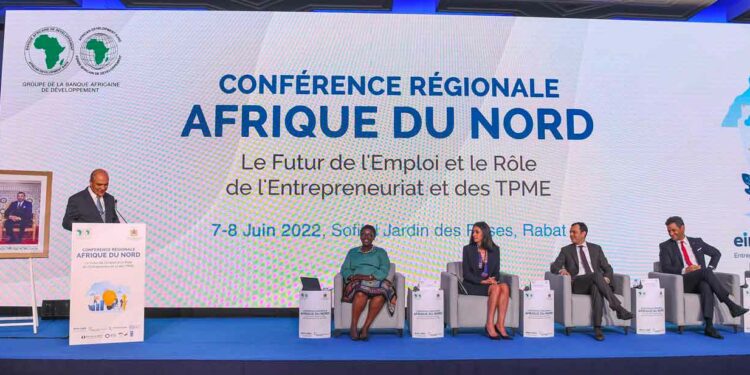“The post-Covid-19 world is opening up new avenues and opportunities. All public and private actors have a role to play in making themselves even more accessible to entrepreneurs. This will only be possible if a new impetus is given to entrepreneurship and MSMEs, with a synergy of all programs, public and private, which will have to be scaled up, have greater capacity, and be seamlessly interwoven.” This was the conclusion of a regional conference held on 7 and 8 June in Rabat, Morocco, on the future of labor and the role of entrepreneurship and MSMEs.
The event was jointly organized by the African Development Bank Group via a new platform known as eina4jobs (link is external) and the Moroccan Ministry of Economic Inclusion, Small Business, Employment and Skills. Eina stands for Entrepreneurship, Innovations and Advice for Jobs. The event brought together about 300 people, including ministers, entrepreneurs and experts from Morocco, Tunisia and Egypt.
Eight specific action points were identified, including: improving regulatory frameworks, investing in high-potential value chains, creating public-private partnerships to leverage investment funding, providing targeted support for entrepreneurs and helping them technically and financially.
Participants exhibited a spirit of consensus-building at the two-day conference, discussing public policies in support of entrepreneurship and learning from the experiences of the three north African countries.
“After the Covid-19 pandemic, questions of employment and entrepreneurship must be addressed differently,” said Younes Sekkouri, Moroccan Minister of Economic Inclusion, Small Business, Employment and Skills. “It is important to find effective approaches and new, innovative solutions that place young people at the center of public policies and bring value to local areas.”
READ MORE: South Africa: Dreams Talks With Michelle Mathews, Director at Viridian
Nadia Fettah, Moroccan Minister of Economy and Finance, said support for entrepreneurship is a priority. “Morocco, Egypt and Tunisia have the potential to create more than 8 million jobs by 2030. To do this, governments need to implement bold and inclusive policies that support and unleash talent,” she said.
The Tunisian Minister of Employment, Nasreddine Nsibi, stressed the need to “mobilize more financing, including from the private sector, because our young people expect an answer.”
READ MORE: Spain: Successful Hosting of the IV Business Leadership Forum Initiative
“We have much in common — Morocco, Tunisia and Egypt — in terms of environment and challenges,” said Nevine Gamea, Egyptian Minister of Trade and Industry. “We are working to meet the needs of our citizens, including our young people, so they can access jobs and opportunities.”
Yacine Fal, African Development Bank Vice President for Regional Development, Integration and Business Delivery, said the Covid-19 pandemic had radically changed how companies conduct business. “Together, we are launching the Rabat Declaration to create momentum and inspire public action to support young people who dare, innovate and start up. Together, let us act in such a way that the world to come is designed to place young people and employment at the heart of the political agenda.”
Denmark Ambassador to Morocco Jesper Kammersgaard said it was “very positive” that the eina4jobs (link is external) platform, funded by Denmark, provides an opportunity to develop a roadmap to address the challenges facing countries in the region.
Beyond the conference, the key delegates, including the German Corporation for International Cooperation; French Development Agency; World Bank; European Bank for Reconstruction and Development; United Nations Development Programme; and International Labor Organization, will engage in consultations around implementing the Rabat Declaration.









